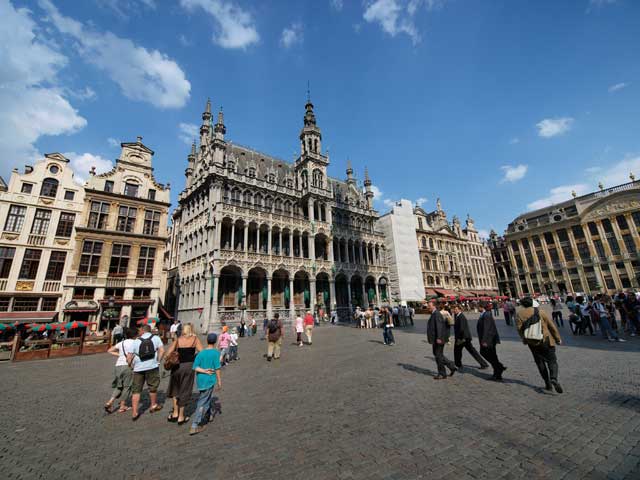Brussels wants you to apply: The European Union has abolished its archaic test

Your support helps us to tell the story
From reproductive rights to climate change to Big Tech, The Independent is on the ground when the story is developing. Whether it's investigating the financials of Elon Musk's pro-Trump PAC or producing our latest documentary, 'The A Word', which shines a light on the American women fighting for reproductive rights, we know how important it is to parse out the facts from the messaging.
At such a critical moment in US history, we need reporters on the ground. Your donation allows us to keep sending journalists to speak to both sides of the story.
The Independent is trusted by Americans across the entire political spectrum. And unlike many other quality news outlets, we choose not to lock Americans out of our reporting and analysis with paywalls. We believe quality journalism should be available to everyone, paid for by those who can afford it.
Your support makes all the difference.If you're a British graduate with an interest in languages and policy, you should consider crossing the Channel in the direction of Brussels, the capital of Belgium. At a time when job opportunities for graduates appear bleak in the UK, the European Union wants new recruits to work in the "capital" of Europe where there are scores of other young people and plenty of cafes and restaurants, not to mention large quantities of good beer and chocolate as well as delicious mussels and snails.
Brussels is home to a range of EU institutions, but while the UK makes up around 11 per cent of the EU population, only five per cent – 1,289 – of those working at the European Commission are UK nationals. Many British graduates don't consider working abroad, yet as EU citizens they can just pack up and go without worrying about visas or work permits.
"We want more British candidates to apply to the EU and there has never been a better time than now," says Huw Davies, head of communication at the European Personnel Selection Office in Brussels. This is because the EU has revamped its Europe-wide selection procedure. No longer will you have to take the feared test, which required a broad knowledge of EU matters that most Britons don't have. Instead, the idea is to recruit on future potential.
Davies says the new application system will be something British graduates will be able to tackle. "We've got rid of the outdated test that had specific questions, about EU laws, for example, because we don't think it tested people's ability to do the job."
There are now two stages to the recruitment process. The first is a multiple choice, computer-based pre-selection test done in the candidate's country of residence. This covers verbal and numerical skills and abstract reasoning and might mean analysing a table of statistics, or understanding a paragraph of text. But while this might sound straightforward, it has to be done in a candidate's second language, which for British applicants means French or German – and here lies the stumbling block for a nation not known for its linguistic skills.
However, EU translator Charles Gittins says there is no reason why British graduates can't catch up with their colleagues abroad. "I refuse to believe that the British are genetically incapable of learning languages," he says. "It's just we haven't been trained with that in mind."
Once you pass the pre-selection test, it's off to Brussels for an assessment, which includes group exercises, a presentation, and an interview. The whole process takes seven to nine months, whereas in the past it could take two years.
The jobs on offer are split into administrators, assistants and linguists. There are now three recruitment cycles a year – administrators in March, linguists in July and assistants in December. "Administrator" is not a dogsbody role; instead it's to do with policy development or project management. The job could mean inspecting fishing fleets in member states, developing a scientific research programme, or drafting a decision of the European Court of Justice. The entry level salary is €4,200 a month.
Assistants play a supporting role in internal management, covering budgetary and financial affairs, personnel work, computing and document management. Then there are the linguists, such as Gittins who works at the Directorate-General for Translation. He translates documents from seven languages into English, which at the moment means translating reports on agricultural products and food safety.
At school, Gittins learnt French, Spanish and Italian, but had no career plan. "The thought of working abroad was always in my mind. But if I'm honest, what I thought about was a UK job with lots of foreign travel." He studied modern languages at Oxford University and sat the old-style EU linguist assessment in French and Spanish. Since he's been in Brussels, he's also learnt Greek, Swedish and Estonian.
So, what's it like to live and work in the city? According to the press officer, Giles Goodall, it's a relaxed place and the concentration of young graduates of different nationalities makes it unique.
The standard of living is far better than at home, says Gittins. "Property prices in Brussels are a quarter of what they are in London, and I now have disposable income. There are definite material advantages to living abroad and working for the EU."
To apply, see www.eu-careers.eu
Join our commenting forum
Join thought-provoking conversations, follow other Independent readers and see their replies
Comments